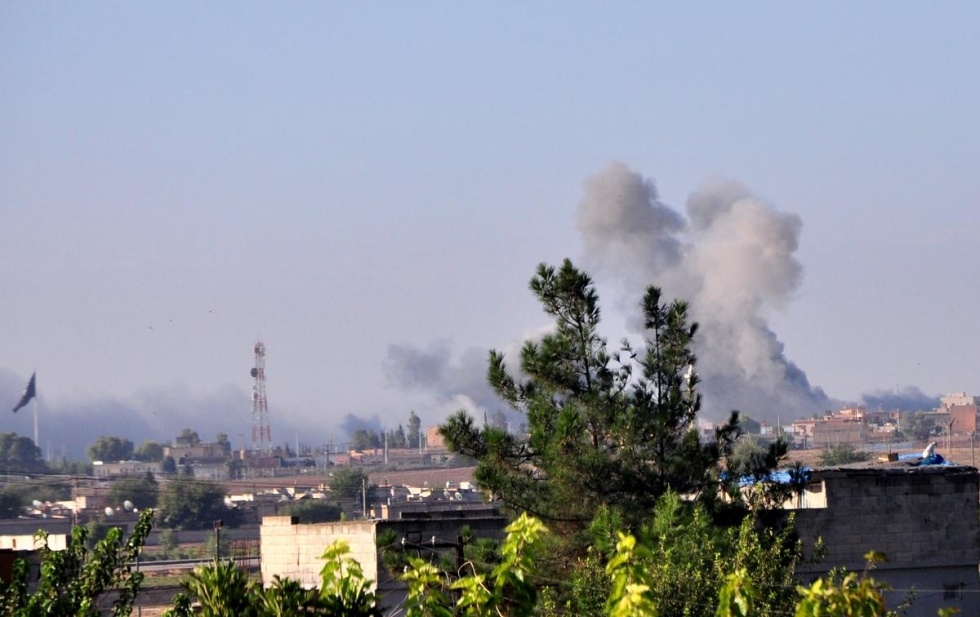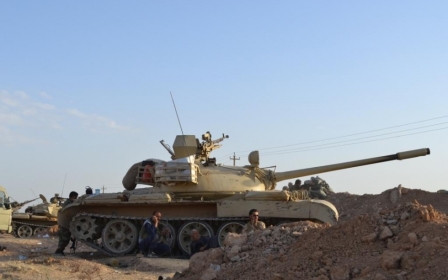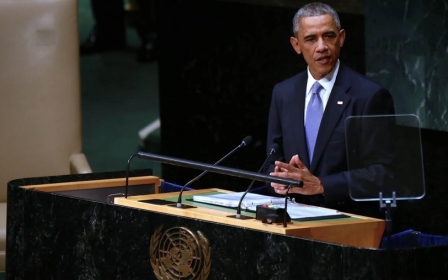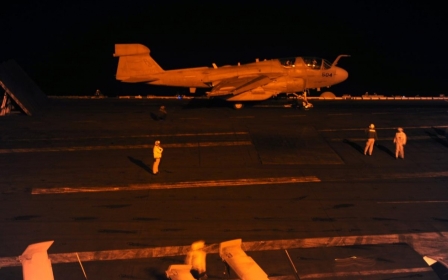This war is not aimed at Islamic State, but at Assad

Watching the debate in the British Parliament last Thursday, over whether Britain should, yet again, launch aerial attacks against the long-suffering people of Iraq, it was striking just how much admission there was of the failure of Britain’s policy in the region hitherto.
That Islamic State (IS) have been emboldened, or even created, by the West’s insistence on supporting the armed insurgency in Syria over the past three years - pouring money, weapons and training (including even in public relations) into the hands of fighters of all shades - was admitted again and again by MPs from all parties, as was the reality that it was precisely the dysfunctional state bequeathed by the occupation that had allowed IS to take root in Iraq.
But those very same MPs then almost all went on to explain that would be voting for the government’s motion. The implicit argument was that, yes, we have been doing the wrong thing for the past three - or eleven - years, but now we have a chance to put it right; indeed it is precisely because we helped create the “beast” that we must now help to kill.
Pretty much every British attack on the Middle East has been justified along the same lines. The bombardment of Libya was supposedly a recognition that Britain’s treatment of Iraq - occupation with ground forces - was counter-productive; ousting Gaddafi using Libyan (and Qatari) forces backed by airpower, therefore, was presented as somehow “overcoming” the “mistakes” of the 2003 invasion of Iraq.
But that invasion itself had been presented at the time as the reversal of the previous, “mistaken,” British policy of supporting the region’s “dictators.” And Britain’s supposed support for Saddam Hussein during the 1980s (if encouraging a self-destructive war can be termed support) was itself, no doubt, presented as an enlightened move forward from the 1950s policy of trying to maintain a puppet king hand-picked by the British Foreign Office.
Each twist and turn of British foreign policy is thus accompanied by an admission that we have been doing exactly the wrong thing up till now; but now we are doing the right thing; that interference was wrong, but this interference will put it right; that violence was a sin, but this violence will atone for it.
Except it won’t. And it won’t because, despite appearances, there hasn’t been any change of heart. The policy has never changed. It has always had the same goal - to stifle any potential of independent development. Thus, when the British-backed Iraqi king could no longer hold back the forces of modernisation, Britain sought to reduce the influence of the communists by supporting a coup by the right-wing of the Ba’ath party. When the Ba’ath party itself ended up overseeing a successful modernisation of the country in the 1970s, Britain did all it could to encourage a war with Iran, ensuring that the wealth of both countries was squandered, their development pushed back by decades.
Then in 1991, Britain was involved in an aerial attack that devastated Iraq’s infrastructure, followed by a crippling sanctions regime the like of which the world had never before seen and led to the death of half a million children.
Just as the “legal” justification for sanctions was about to run out - with the UN inspections team claiming Iraq would likely be given a “clean bill of health” over its weapons programme within months - came the invasion of 2003, which ended up imposing a constitution which institutionalised sectarianism and created a political system in which “democracy” was reduced to competing promises to maximise favours to your sect, at the expense of everybody else.
The result was that the Sunni minority were rendered the implacable enemies of the government, leading to the disaster now unfolding. In every case, with every intervention, the result has been surprisingly consistent - that Iraq’s ability to realise its enormous potential has been stymied and set back. The supposed Dasmascene conversions by British policymakers turn out, on closer inspection, to be mere tactical shifts. Our MPs would do well to admit these continuities instead of constantly attempting to delude their constituents, and themselves, into thinking that the leopard has changed it spots.
And so to today. This war - presented as a new war against a new enemy, IS - is in fact a continuation of the three-years old war against the Syrian state - itself a continuation of the centuries-old war against development and independence amongst the states of North Africa and West Asia, and indeed the entire Global South.
The fact that so many of the MPs in the debate who voiced support for airstrikes, did so with an admission that they will almost certainly fail to destroy IS, is one clue that this war is not what it purports to be. In fact, the British government is both unable and unwilling to achieve its stated goals of destroying IS.
Unable, because, as all serious military analysts agree, airstrikes alone cannot destroy an organisation like IS. IS’s continued progress towards Baghdad this week was a particularly swift vindication of the point. But it is the reluctance on the part of the British and US governments to coordinate their efforts with the forces which have actually been fighting against IS and its allies for years - that is to say Syria, Iran, and Hezbollah - which really demonstrates their insincerity on the issue.
Why do they not pursue a more effective strategy? Because the defeat of IS is not really their goal. IS and its friends have played right into the hands of British foreign policy for the past three years, acting as the vanguard in the Anglo-American proxy war of attrition against the Syrian state; there is no reason to believe Britain has given up on this strategy now.
So what will this war achieve? Firstly, IS will benefit from a credibility that they have so far been denied - the credibility of being able to pose as an “anti-Western” force. This will undoubtedly bring them more recruits, more support, and more funding. But an even bigger shot in the arm will come from the image of strength that they will gain from surviving airstrikes. Nothing succeeds like success, as they say, and the image of endurance and perseverance apparently “against the odds” will gain them an appeal hitherto unimaginable.
And what of the “war against Assad”? Far from this having been eclipsed by the “war against IS,” it is at its foundation. Having been thwarted from bombing Syria in August 2013 by Syrian, Russian, Chinese and Iranian steadfastness - and subsequent parliamentary nervousness in both the US and Britain - the West are now indeed bombing Syria.
David Cameron, for his part, cleverly designed his motion only to refer to airstrikes against Iraq - ensuring that Syria was largely kept out of the debate - but insisted that he could expand the operation into Syria without parliamentary approval once it was underway. We are now being told that the West are being “forced” to intervene in Syria because Assad failed to defeat IS, but the truth is precisely the opposite - the West is now in Syria because IS and its friends – the recipients of so much lavish diplomatic, financial and military support from the West and its allies these past three years - have failed to defeat Assad.
The US - alongside Britain shortly, no doubt - are thus going into Syria in order to take more direct control of a war in which, for much of this year, the momentum has been with the Syrian state forces. Indeed, there has already been talk of a Turkish ground invasion of Syria, along with a new initiative aimed at training yet more insurgents in Saudi Arabia (5000 more, apparently) - the breeding ground of the violent sectarianism that underpins IS. The idea is that if anyone is to seize ground from IS, it should not be the secular forces of the Syrian government (the only power capable of actually governing the country, even according to US General, Martin Dempsey), but rather the forces of NATO and their IS lookalike allies.
Why does Cameron claim this war will take years? Because he knows it will escalate. It will escalate because IS is only the preliminary target, the pretext. The ultimate target is, as it has ever been, the Syrian state itself. It is revealing, in this regard, to look at the pattern of US bombing within Syria that has already been revealed. A Reuters report from last week noted that the strikes “seemed to be intended to hamper Islamic State's ability to operate across the border with Iraq, where it also controls territory.” In other words, the aim is not to destroy IS in Syria - but, as far as possible, to keep IS in Syria, and to destroy Syria itself.
- Dan Glazebrook is a political writer specialising in Western foreign policy. He is author of Divide and Ruin: The West's Imperial Strategy in an Age of Crisis.
The views expressed in this article belong to the author and do not necessarily reflect the editorial policy of Middle East Eye.
Photo Credit: Smoke rises from Syria's Tel Abyad town near Turkish border as the US-led coalition strikes IS targets on 29 September (AA)
New MEE newsletter: Jerusalem Dispatch
Sign up to get the latest insights and analysis on Israel-Palestine, alongside Turkey Unpacked and other MEE newsletters
Middle East Eye delivers independent and unrivalled coverage and analysis of the Middle East, North Africa and beyond. To learn more about republishing this content and the associated fees, please fill out this form. More about MEE can be found here.





